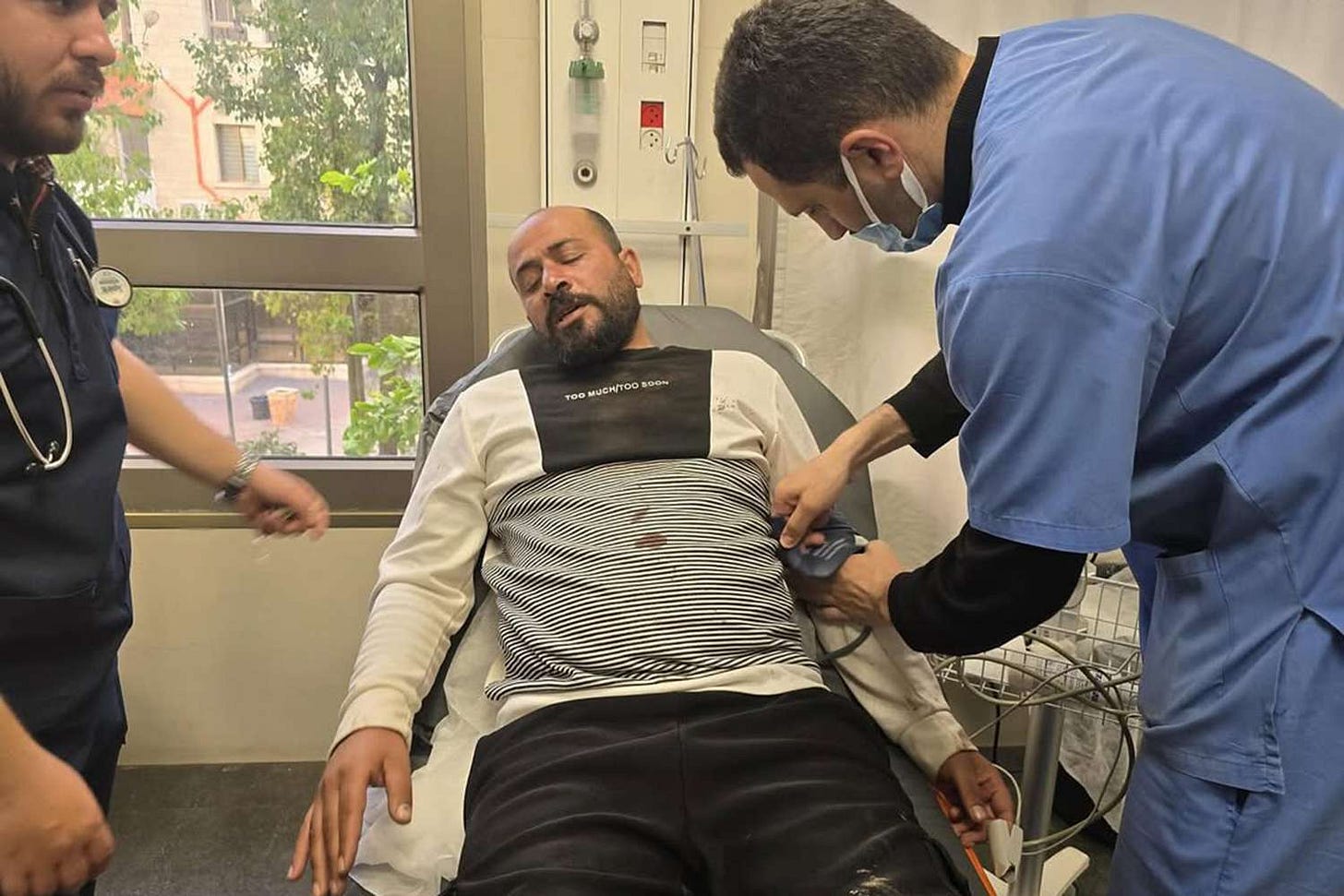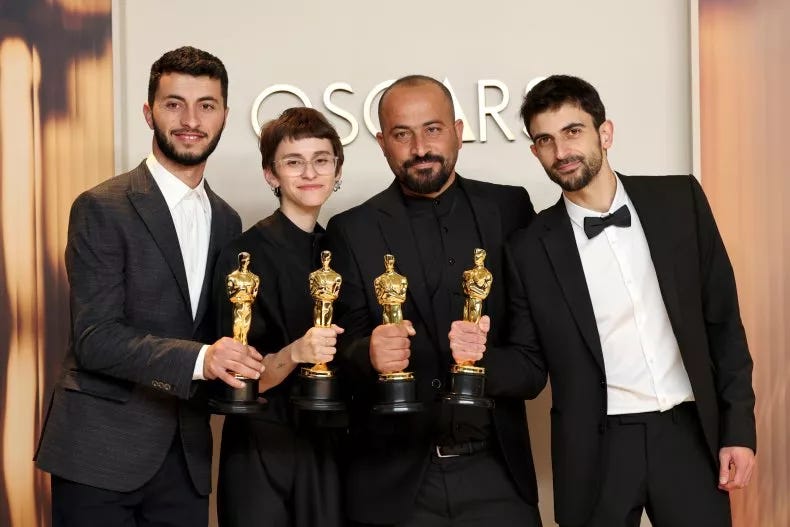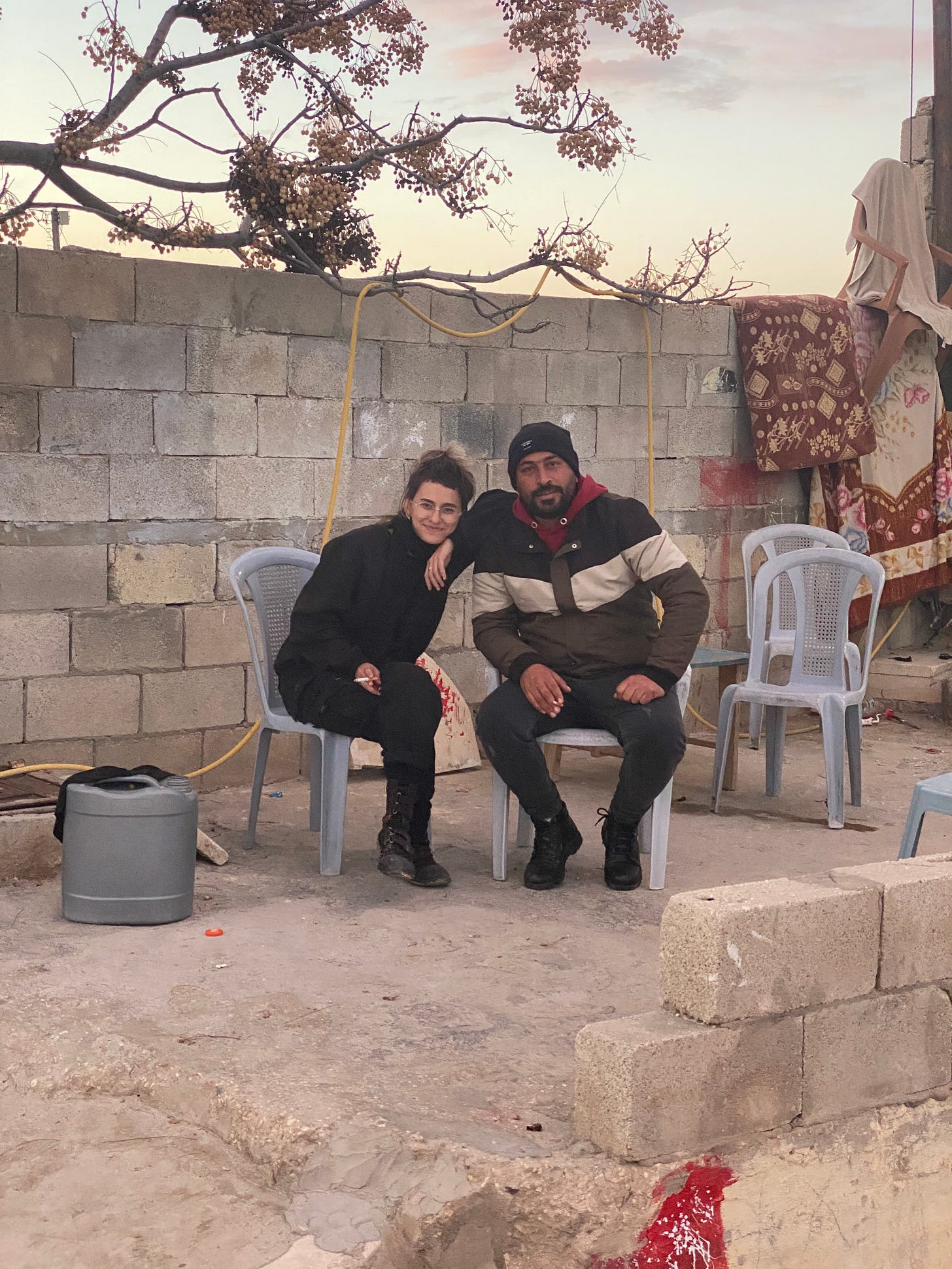Fight for Hamdan. Fight for us all.
A friend's assault turned into global news. What do we do now?
At first, I wasn’t so worried when I got the text that my friend Hamdan Ballal from the southern West Bank had been violently attacked. It may sound weird, but honestly, when you know folks who live under Israeli military occupation, violence is the norm, not the exception. Lots of my friends and comrades in the South Hebron Hills (Masafer Yatta) have been assaulted by Israeli settlers, police, and military; other Jewish-American solidarity activists and myself were smacked, bludgeoned, and beaten up by soldiers on my birthday back in 2022. It was the most traumatic evening of my life, but it’s normal for Palestinians, even if it’s not for good Jewish boys from metro Detroit. But this attack on Hamdan wasn’t normal, even by South Hebron standards.

See, Hamdan won an Oscar a few weeks ago for his documentary, “No Other Land.” As my boss Libby Lenkinski wrote in Haaretz this week, that little statuette does come with some privileges. No, it doesn’t stop Jewish supremacist settlers from raiding your village, as they did on the night of March 24 in Susiya, Hamdan’s village. It doesn’t shield you from kicks to the head, which Hamdan endured during his detention. It doesn’t keep settlers and soldiers from snatching you out of the ambulance after the initial assault, which they did. It doesn’t prevent the soldiers from abusing you all night while your family and friends worry themselves sick. But that Oscar, it does make the rest of the world respond differently. Unlike the undifferentiated masses of Palestinians in the West Bank, in Gaza, and in Israel, Hamdan is a person in the world’s eyes. Would Selena Gomez and Samuel L. Jackson have handed the Academy Award to a terrorist? No, says the casual observer on Instagram. Hamdan is legit. Hamdan is real. Something is up here. Something is wrong. What’s going on?
It’s surreal to see one of the South Hebron homies up on the TV screen. My wife was out of town on Oscar night, so I flipped on the awards show mid-stream when I thought the announcement of “Best Documentary” was coming up. When I heard Samuel L. enunciate the victor, “No Other Land,” I–I just couldn’t. I saw my buddy Basel Adraa (Hamdan’s co-director) striding down the aisle, grinning big (like a fool!) and I felt something. I felt hope. I talk about hope all the time. Intellectually, I argue regularly in the context of my job as a peace activist and anti-occupation educator-organizer that we must have hope: the only future for Israelis and Palestinians is a shared future, without occupation, without Jewish supremacy, with safety, freedom, and equality for all. But to be honest, I don’t feel hope in my body often. I feel anxious: anxious that my American Jewish community has chosen the way of war over diplomacy and nonviolent reconciliation; anxious that the South Hebron homies, like Basel and Hamdan, might get hurt. (At least once a week, I dream about the South Hebron Hills, where I spent several months as a human rights observer back in 2022, and I see my friends getting hurt by soldiers, and I wake up close to tears with the words on my lips, “I just don’t want to see my friends get hurt anymore.”) But watching Basel walking down the aisle, grinning like a fool, and walking up on stage, I was filled with pride and joy. Basel leaned into the mic and told the world that he had a daughter, two months old, and his dream was that his daughter wouldn’t have to live the life that he has lived, one with constant harassment by ethnic supremacist settlers, home demolitions by Israeli authorities, and the fear of deadly violence at a moment’s notice. Not to take anything away from Basel and Hamdan, or their Israeli co-directors Yuval Avraham and Rachel Szor, but I honestly felt that this was my victory too, the movement’s victory, the victory of all the ruff-and-tumble, rag-tag activists (Palestinian, Israeli, Jewish-American, international) who had been showing up for the people of Masafer Yatta in their righteous struggle against Israeli occupation. For years. For decades. It turned out, we don’t always have to lose. We can win!

After I saw the videos of the settler-soldier attack on the village of Susiya, I was worried sick. Dozens of settlers, masked, throwing stones, breaking car windows, water tanks slashed and spewing precious water. I remembered the video that the Israeli human rights organization B’tselem had posted months earlier of a notorious settler, Shem Tov Lusky, threatening Hamdan, telling him that he was going to “rape” him, explicitly referencing the horrors of what Israeli guards had done to Palestinian detainees in the Sde Teman prison, Israel’s Abu Ghraib. Lusky called Hamdan his “bitch.” Hamdan, a proud father, a committed nonviolent activist, calmly replied, “I’m not your bitch.”
After a night in Israeli detention, in which he endured torture and harassment, Hamdan was released on Tuesday. He described a ferocious attack. He had been expecting an assault by the settlers following his Oscar win, but not like this, he said. Hamdan told the Associated Press that, “he was kept blindfolded for more than 20 hours, sitting on the floor under a blasting air conditioner. The soldiers kicked, punched or hit him with a stick whenever they came on their guard shifts, he said. [Hamdan] doesn’t speak Hebrew, but he said he heard them saying his name and the word ‘Oscar.’ ”
Isn’t this a classic abuser scenario? Hamdan endures oppression at the hands of Israeli authorities his entire life. When he goes and tells the world, via his documentary, that he and his people are being abused, the abusers punish him all the more. This isn’t unique to Palestinians under Israeli occupation. This is what women endure at the hands of their violent male partners. This is what kids face under the rule of despotic parents. This is…
This is what racist authoritarianism looks like. If my brothers and sisters in Israel–that is, Israel proper, not the occupied West Bank–want a view of what the future holds for them as Netanyahu advances his assault on Israel’s judiciary, just look at Hamdan’s face, scarred and bruised. No one–literally no one: not Hamdan, not me, no one–expects Hamdan’s attackers to face justice. They never do. As the veteran Israeli-American peace activist David Shulman told me this week, the settlers, the army, and the police are one entity now: under the leadership of Minister for National Security Itamar Ben-Gvir, the police serve the settlers in the clear light of day, no question about it. Not that the police were neutral arbitrators of conflict prior to the current government (I know from personal experience and from the Israeli human rights monitor Yesh Din that there is truly no justice under occupation, in which 94% of settler crimes go unaddressed or unpunished), but now, the fact of government complicity in settler violence is plain as day to anyone who cares to look.
The liberal-democratic camp in Israel, which encompasses a majoritarian big tent from center-right to the left which opposes Netanyahu’s move to gut the country’s judiciary, has been out in the streets again this week protesting against the current government as it seizes control of the judicial appointment process, Netanyahu’ attempt to fire Israel’s attorney general (which is unprecedented) as well as his firing of the head of the Shin Bet (Israel’s FBI, approximately). Netanyahu is continuing the pre-10/7 judicial coup, now under the cover of his war on Gaza. What is the lib-dem camp afraid of? They don’t want to live like Palestinians do in the West Bank. They don’t want to live without the rule of law, without the state’s protection against religious extremists (like Ben-Gvir and Finance Minister Betzelel Smotrich, or Hamas and Islamic Jihad) who mean them harm, and without due process. In short, they want democracy, they want their civil and political rights, they want self-determination. (Which is what Palestinians want too, by the way.)
This should all resonate with American audiences, especially liberals and progressives, who are currently filled with fear and loathing thanks to the Trump-Vance-Musk administration’s dismantling of federal government institutions. As the New York Times pointed out recently, it’s no accident at all that Netanyahu and Trump are both targeting the courts, which, in both countries, despite the structural differences in the balance of powers between Israel and the U.S., remain a crucial bulwark against right-wing authoritarian power grabs. Further, it’s no accident that both regimes are individually targeting the most vulnerable populations resident in both nation’s sovereign territory, as in the Department of Homeland Security and Immigration and Customs Enforcement kidnapping pro-Palestine (!) university students in Boston and New York, as well as the assault on Hamdan. It’s a flex. It’s intimidation. It’s a dare to dissent, a dare to resist.
Really, there is only one answer. Wherever we are–in Israel/Palestine, in America, in Europe, in Latin America–we must resist. The activist cliche, “Think globally but act locally,” very much applies. This is a global anti-democratic movement. Trump and Netanyahu rotate around the same axis as Victor Orban in Hungary, Vladimir Putin in Russia, Nayib Bukele in El Salvador, Modi in India, and the list goes on. So resisting locally–e.g., by protesting against DHS attempts to deport lawful residents of the U.S., by providing protective presence for agrarian Palestinian communities on the West Bank–you are resisting an international anti-democratic backsliding. Fight one fight and you fight them all.
Fight for Hamdan, fight for us all.



